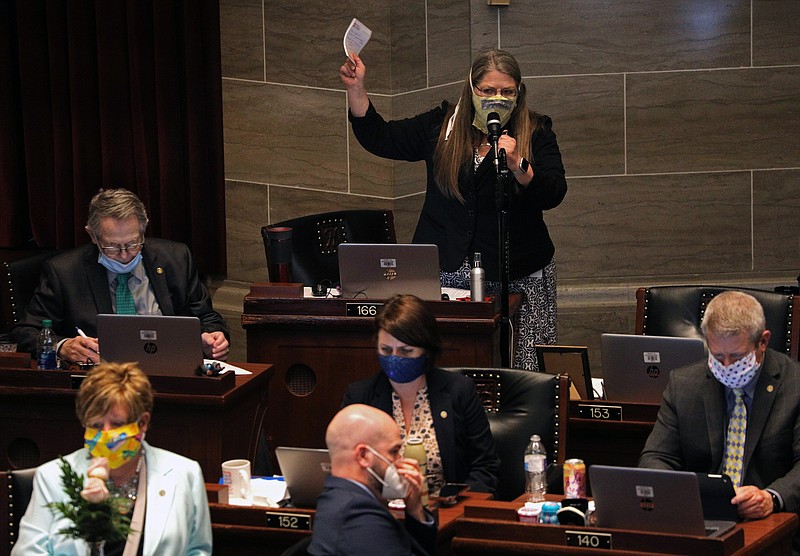[<a href="https://www.newstribune.com/news/health/" style="color:#33AEFF">access the News Tribune Health section</a>]
Missouri lawmakers wrapped up their work Friday by passing a bill allowing people to vote by mail because of the coronavirus and ramping up criminal penalties in response to an uptick in violent crime in the state's biggest cities.
Legislators signed off on the special voting provisions for the 2020 elections shortly before their deadline to pass bills in an unusual session that was interrupted for several weeks because of concerns about the virus that causes COVID-19.
Voters currently can request absentee ballots only if they provide an excuse for why they can't vote in person. Illness is one option, and election authorities in areas including Boone and St. Louis counties have said all voters can use that excuse to request an absentee ballot because of the pandemic.
But the law isn't explicit on whether the illness excuse would cover healthy voters who are concerned about catching or spreading COVID-19, and voters in other parts of the state might not be able to get an absentee ballot for that reason.
Under the bill sent to Gov. Mike Parson, people considered at-risk of the coronavirus - those age 65 and older, living in a long-term care facility or with certain existing health problems - could vote absentee without needing to have their ballot notarized. Anyone else could cast a mail-in ballot but would need to get it notarized. The provisions would apply only for the 2020 elections.
Senate Majority Leader Caleb Rowden, a Columbia Republican, said the measure strikes a balance between access to voting and reasonable protections against fraud.
Republican Secretary of State Jay Ashcroft on Friday said he no longer supported the measure after lawmakers stripped a contested photo ID requirement out of it.
"Without the agreed upon safeguards, I have grave concerns that this bill will make voting less secure and jeopardize the integrity of our elections," Ashcroft said in a statement.
But lawmakers - only some of whom wore face masks during debate - faced pressure to act because of the disease, which has sickened more than 10,000 people in Missouri.
Lawmakers also faced pressure to act on crime legislation following a bloody 2019 and a violent start to 2020. The deaths of two men Tuesday night were Kansas City's 63rd and 64th homicides this year. St. Louis police reported 53 homicides as of Friday.
A bill headed to Parson's desk would create the crime of vehicle hijacking, expand the number of crimes that are considered dangerous felonies, ban probation for some crimes and broaden what's considered a criminal street gang, along with increased penalties for taking part in gang activities.
"This is going to help get the most violent habitual offenders off of the streets," Republican Rep. Nick Schroer said.
The bill sparked outrage from House lawmakers who said it could reverse a drop in the state's prison population following a bipartisan push for criminal justice reform in recent years.
"It doesn't make us safer," Republican Rep. Shamed Dogan said of longer prison sentences. "It sounds good in campaign ads, but it does not actually increase public safety. This has been shown time and time and time and time again by research."
Longstanding efforts to make Missouri the last state to adopt a prescription database to track addictive medications ground to a halt Friday.
Supporters said the goal of a prescription drug monitoring program is to alert doctors of potential medication misuse so they can treat patients with addictions, but Republican skeptics for years have fought against creating a database over concerns about patient privacy.
Some Senate Republicans expressed no interest in compromising on the House-backed bill Friday after a feud between the two GOP-led chambers.
At issue was a House provision that could thwart efforts to build a wind-energy power line that was slipped onto another Senate bill without senators noticing. Senators on Thursday hurriedly revoked a bill they had just passed, a highly unusual move, when they caught the amendment.
"I'm just not in the mood to help the House out today," Republican Sen. Bill Eigel said Friday.
Few bills have made it across the finish line so far during lawmaker's roughly five-month session, although the Republican-led Legislature this week succeeded in sending a new redistricting plan to the ballot that will ask voters to undo key parts of another redistricting measure they passed less than two years ago.
Supporters wanted to accomplish the move this year because new state House and Senate districts will be drawn in 2021.

